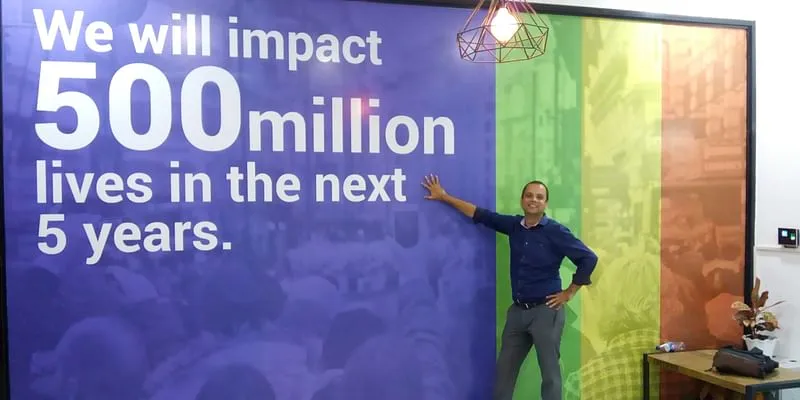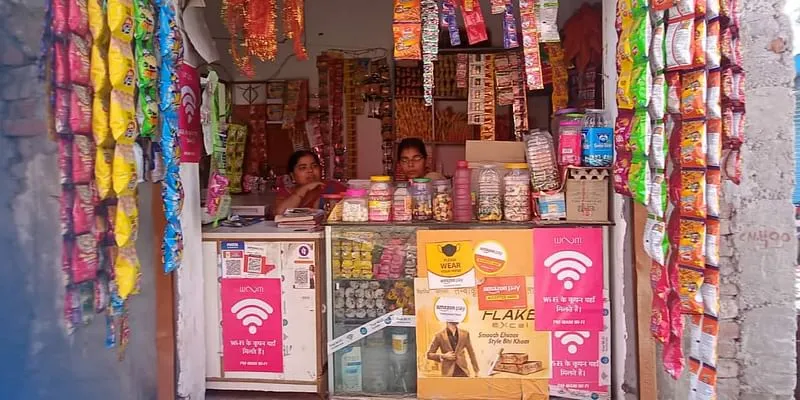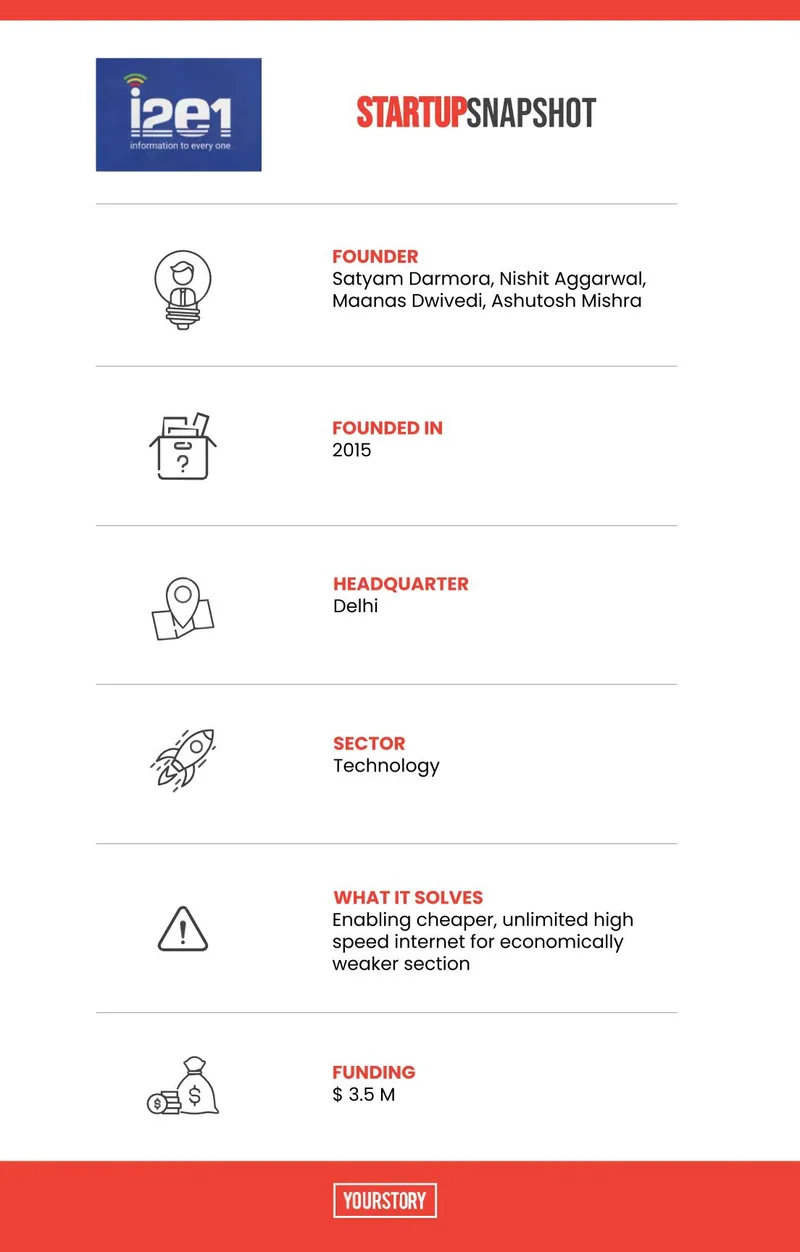This Delhi-based startup is enabling unlimited high speed internet for masses at just Rs 5 per day
Delhi-based startup i2e1 aims to create over one million WANI-compliant hotspots across India by offering instant and easy connectivity to high-speed, reliable, and secure internet services through its DOT-approved devices.
Digitisation is the need of the hour, and the Indian government is going all out to maximise the reach of Digital India, a flagship programme that aims to transform the country into a digitally empowered society and knowledge economy.
However, this digital dream isn’t possible for a large section of the Indian population, who cannot afford to buy expensive high-speed internet plans for their homes.
Delhi-based technology startup aims to change that by using its technology and innovative business model to tap “extra” internet provide high-speed internet to the masses for as low as Rs 5 a day.
The startup’s aim is simple: to ensure true digital inclusion by helping bring the next 500 million under the internet umbrella.
The story started in 2015, when Satyam Darmora and his associates, Nishit Aggarwal (CPO), Maanas Dwivedi (CSO), and Ashutosh Mishra (CTO), started i2e1 as a startup incubated at IIT Delhi.
Today, i2e1, which stands for “information to everyone”, uses the government’s revolutionary PM-WANI architecture to revolutionise internet delivery across India.

Satyam Darmora, CEO, i2e1
Creating tech and solutions for retailers
In the first phase of evolution, between 2016 and 2020, the startup solved the problem of high-speed internet by matchmaking with retailers and consumers across 4,000 locations in 52 cities.
Numerous small retailers had already taken an internet connection but were not using it completely. So, i2e1 created a solution by allowing them to share the “extra internet” with their customers in the form of giving them free WiFi as a service.
“When we created a tech platform, we created cloud-based devices that would help any shopkeeper/retailer to give free WiFi to their customers. Most had an internet connection and were using only 10 percent of that; the remaining 90 percent was going to waste. With i2e1, this can be converted into a branded signal and a customer can login in this network using their phone number,” says Satyam, CEO and Co-founder of i2e1.
In this phase, i2e1 provided a service that let retailers authenticate customers and create brand awareness by offering free internet (retailers could even put a cap on usage). These were primarily restaurants and cafe-like Chaayos, Chai Point, as well as small retailers. The platform created a CRM, which allowed retailers to understand user behaviours and capture user information – making it a win-win situation for both, retailers and customers.
Catapulting the model with PM-WANI
Realising that it was possible to ensure cheaper internet availability, the startup took its concept to TRAI in 2016. The founders requested TRAI to allow any person with extra internet to sell it to someone else, “allowing the economically weaker section to avail high-speed internet at a cheaper rate”.
“Before this, only a licensed Internet Service Provider (ISP) could sell internet,” the CEO says.
Satyam adds that their existing work and technology allowed them to government that this was possible “without compromising on data security” and would create high speed internet at a very, very cheap price point.

PDO by i2e1 in Jaitpur area of Delhi
This ultimately resulted in the Prime Minister’s Wi-Fi Access Network Interface (PM-WANI), which aims to proliferate broadband across the country through public Wi-Fi Hotspot providers and was launched in December 2020.
In January 2021, i2e1 set up Wiom, the first PM-WANI compliant solution. Wiom provides high-speed unlimited internet at homes for as low as Rs 5 a day, Rs 20 a week, and Rs 50 a month.
Market size and road ahead
As much as 80 percent of the internet is consumed as home internet across the world, but India is severely underpenetrated - just 7 percent as compared to 92 percent in China and 60 percent in Russia and Brazil.
Using the recent PM-WANI regulatory change in the telecom sector, Wiom has created a shared internet economy platform that is making high speed (>30 Mbps) and unlimited internet available for just Rs 60 per user per month.
i2e1 has raised $3.5 million till date from investors like Omidyar Network, Auxano Ventures , and 3one4 capital.

Satyam says, “PM-WANI, also termed the UPI of Internet, is a completely new framework. Like UPI transformed the payment sector, WANI is destined to impact the internet delivery space. It makes asset utilisation more efficient and allows new platform players. Being the first mover is the strongest moat for any platform play and we are aware of it. As of now, there are not many players in this exact category.”
i2e1, under the brand name WIOM, acts as a Public Data Office Aggregator (PDOA) and was the first PDOA to go live. Today, there are ~ 10 PDOAs live as of today. Some of the early entrants are HFCL, WiFi Dabba, CSC etc.
“PDOAs help individuals to acts as internet resellers using a government-approved solution and deliver broadband services to subscribers without much hassle. This, in turn, increase employment opportunities for retailers to become PDOs and gives a boost to the government’s Digital Bharat vision,” Satyam says.
The startup is targeting low-income households and claims to have 500,000 monthly users. The company, which has a team size of 38 members, is currently at $1 million ARR and plans to have 10 million users by 2025.
Satyam says i2e1 aims to create over one million shared internet points across India by offering “instant and easy connectivity to high-speed, reliable, and secure internet services” through its PM-WANI-approved devices.
Edited by Teja Lele










